Done correctly, though, you may not need to.
One of my more popular articles and videos is How Do I Recover My Hacked Facebook Account?
I frequently hear from people who have lost access to their Facebook accounts for one reason or another. Sometimes they lose access to the only copy they have of photos, videos, and more.
Only copy? They’re in only one place?
That means they weren’t backed up. That’s not good. You can lose everything forever if it’s in only one place.

Backing up Facebook
Losing access to your Facebook account means losing all your photos, messages, contacts, and more. Don’t rely solely on Facebook. Always save your original photos and videos, and consider periodically downloading your Facebook activity to avoid losing data.
How Facebook accounts are lost
It’s easy to become complacent and assume your account will always be there. Particularly if you think you’re doing security correctly, you might believe there’s little risk.
Little risk is not the same as no risk.
You can lose your Facebook account in ways that are not under your control.
It could get hacked. Yes, if you have appropriate security — most notably two-factor authentication — then getting hacked is not a huge threat, though it remains a risk. More commonly, though, I hear from people who haven’t set up two-factor or recovery information, or who didn’t keep their recovery information current. They’re the ones who end up losing their account forever.
Your account could get suspended for policy violations. This is frustrating because all too often, these violations aren’t violations at all. The Facebook content moderation AI seems to have gone a little nuts and is flagging otherwise completely benign posts as violating the rules. Of course, if you violate the rules regularly, you could easily have your account suspended. The real concern here is that even if you’re playing by the rules, Facebook might go off the rails — and take your account with it.
There are other ways to lose access to your account, but those are the ones to worry about.
Help keep it going by becoming a Patron.
What you might lose
There’s more to your Facebook account than you might realize.
- Photos and videos
- Messages and conversations
- Friends list and contacts
- Posts and status updates
- Events and calendar information
- Pages and groups you manage
If you lose your account for any reason, all that is gone. Period.
Backing up Facebook
The simplest way to back up your Facebook information is to use Facebook’s own tool. It’s called “Download your information”.
In the desktop version of Facebook.com, visit:
https://accountscenter.facebook.com/info_and_permissions
Caveat: Facebook changes where things are from time to time, so if this doesn’t work or if it doesn’t contain the process below, search Facebook settings for the option to download your information.
Once you’re in the “Accounts Center”, click on Download your information.
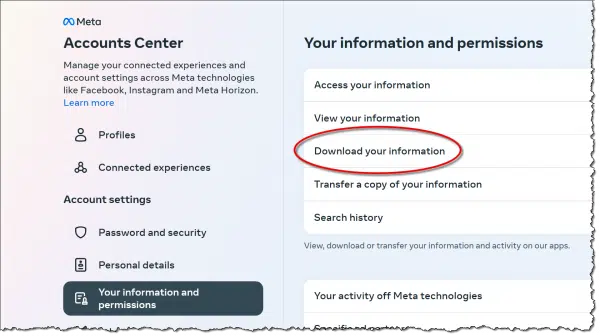
In the next dialog, click on Download or transfer information.
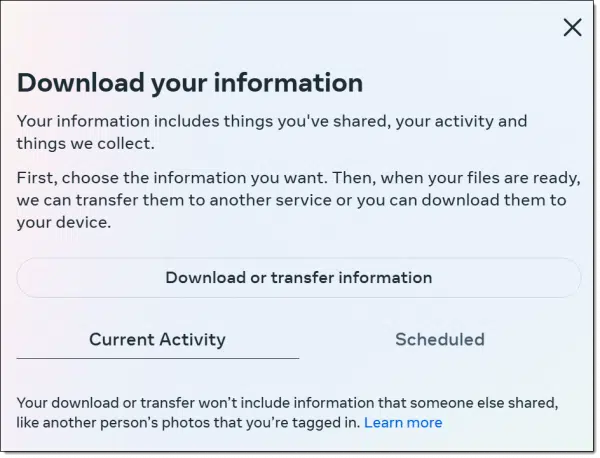
Then, make sure the account(s) you want to download are checked, and click Next.
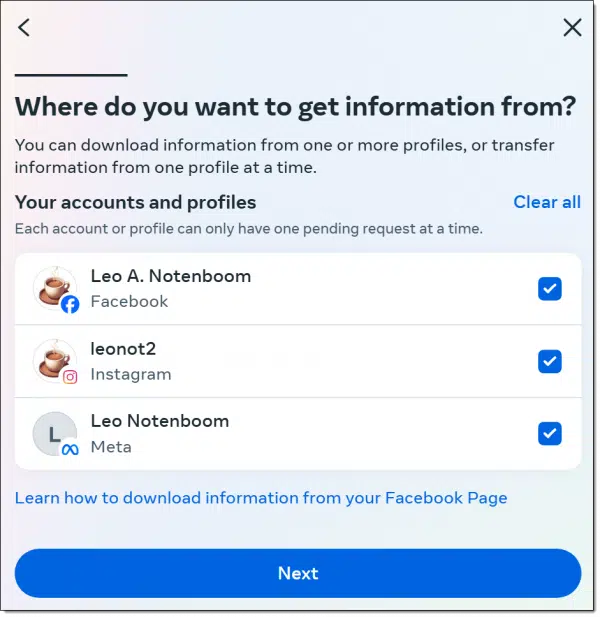
The next dialog controls how much information you want to download.
My recommendation is to click on Available information to download everything.
Clicking on Specific types of information will walk you through a selection process to pick and choose what you want. This might be appropriate if you know you only want your photos, for example.
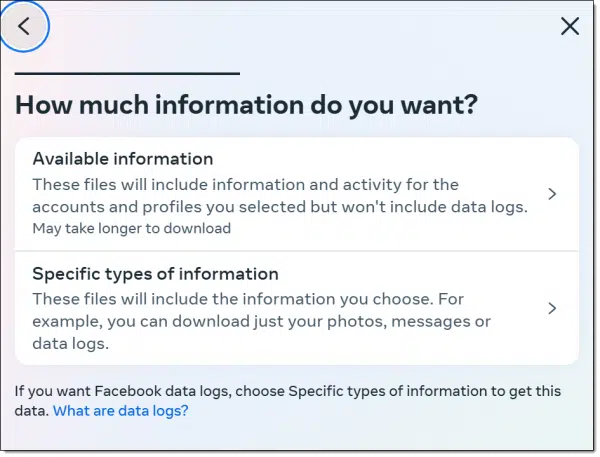
Unless you know otherwise, leave the format as HTML.
The final step includes choosing a date range and a format.
The date range depends on whether you’ve backed up before and/or how much you want. When in doubt, change the date range to “All time”. Options include the last week, last month, and last three months as well as a “custom” option to define your own date range.
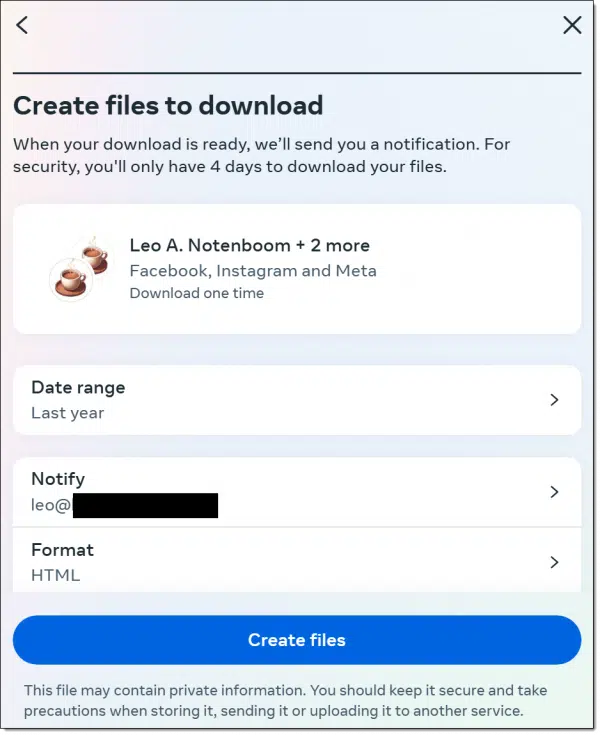
Click on Create files.
You’ll then be shown information about the data collection in progress under “Current Activity”.
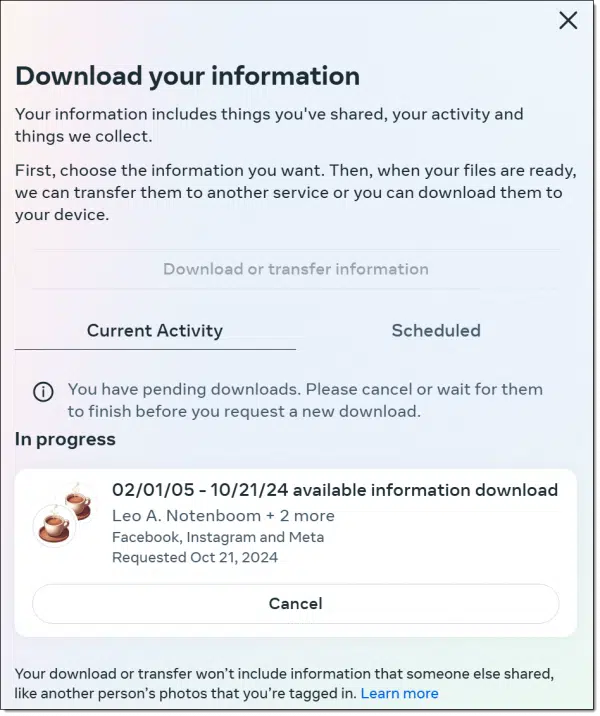
Depending on how much information is to be gathered, this can take from hours to days. In my case, that’s nearly 20 years of information, so I expect it to take a long time to be ready.
Once it’s done, you’ll get a notification that it’s ready to download.
You can do this periodically, of course, in which case you can select shorter recent date ranges to download.
On the other hand, you may not need to do this at all — and it’s the reason I, as devoted to backing up as I am, haven’t downloaded my Facebook account in 20 years.
Maybe don’t back up Facebook
The things most people are concerned about losing are their photos and videos. When they express that concern, it’s typically because they’ve uploaded the images to Facebook and deleted the originals.
Don’t do that.
Never delete your originals.
Archive or back them up somehow, but never trust Facebook (or any other social media platform) as the only repository for your precious memories.
You could lose access to your account. But even more than that, many of these platforms, including Facebook, reduce the quality of the images you upload. Even if you download it again later, you’re not getting the image with the same quality as you uploaded to begin with.
I’ll say it again: never delete your originals.
If you don’t care about your other activity, such as your messages, comments, contacts, likes, etc. — if all you care about is the media you’ve shared — then by never deleting the originals, you won’t lose anything should you lose your Facebook account.
You may choose to not back up your Facebook account at all.
Do this
Back up or not, but make a conscious decision based on what you would lose should your Facebook account be lost.
And never delete the originals, no matter how else you use them or where you share them.
Subscribe to Confident Computing! Less frustration and more confidence, solutions, answers, and tips in your inbox every week.
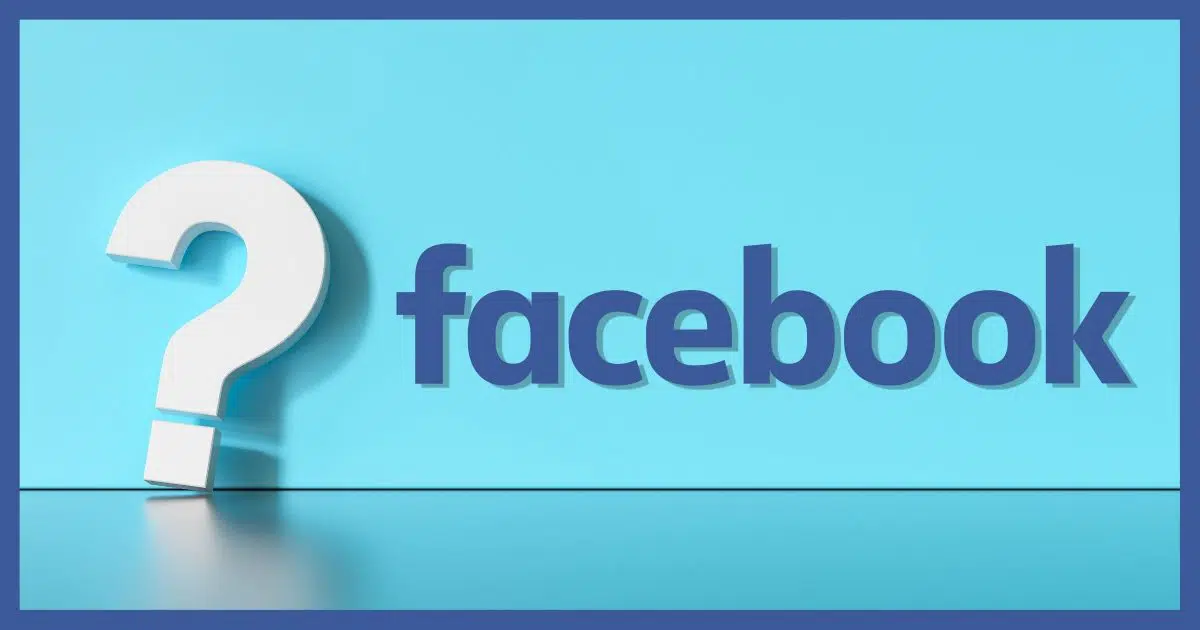
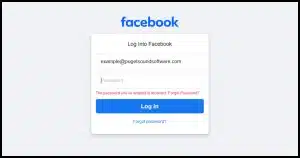




If you don’t remember the last time you backed up, you can check the last time you downloaded the information and back up everything after that date to save time and disk space.